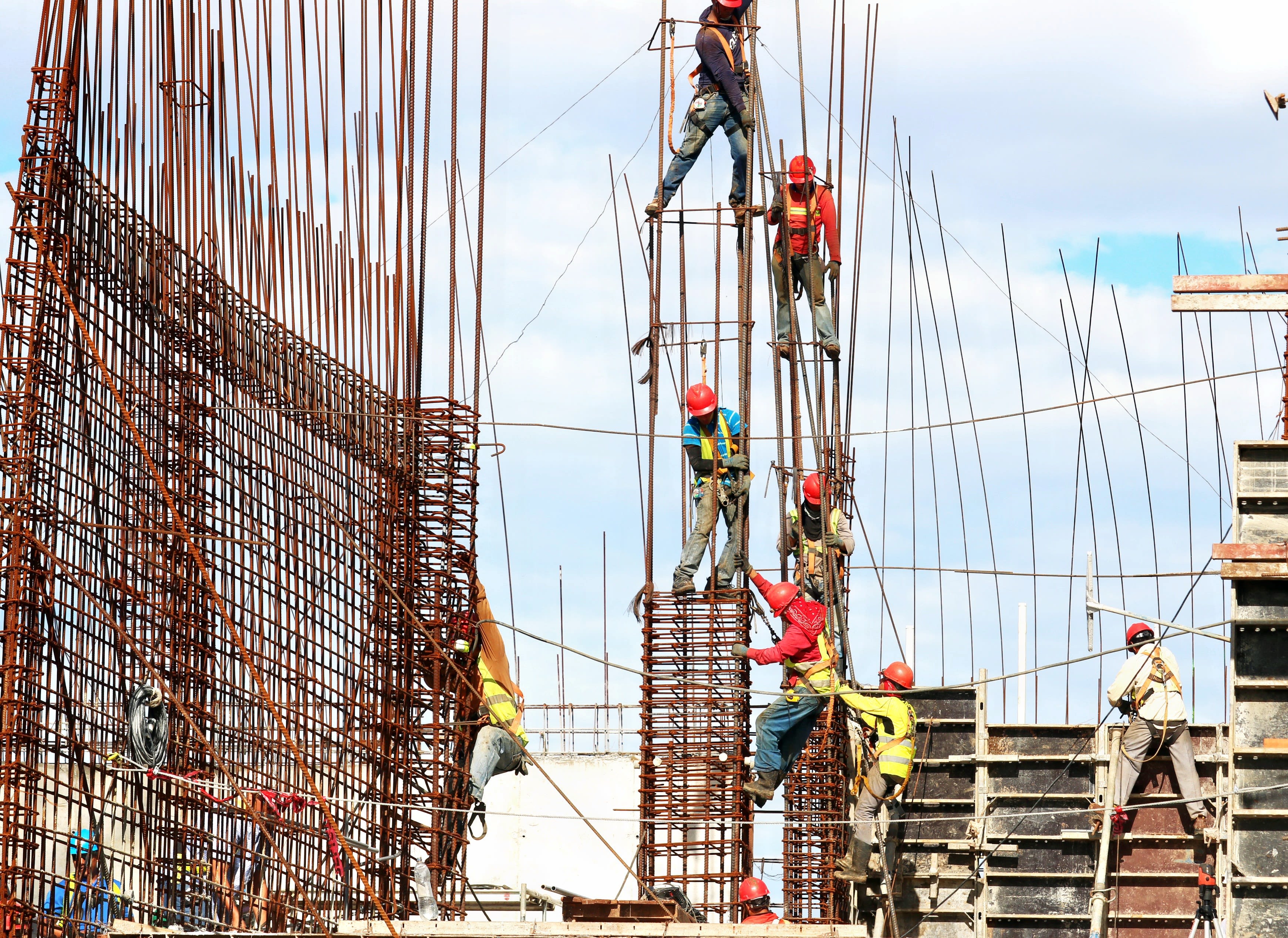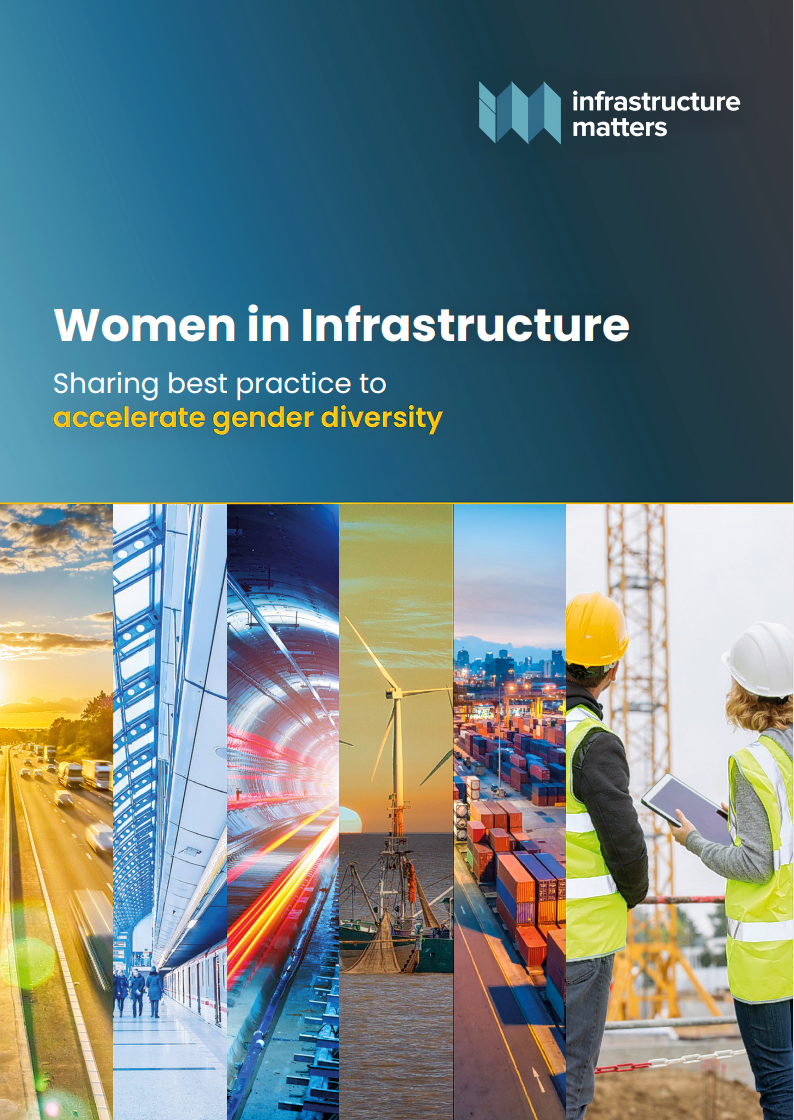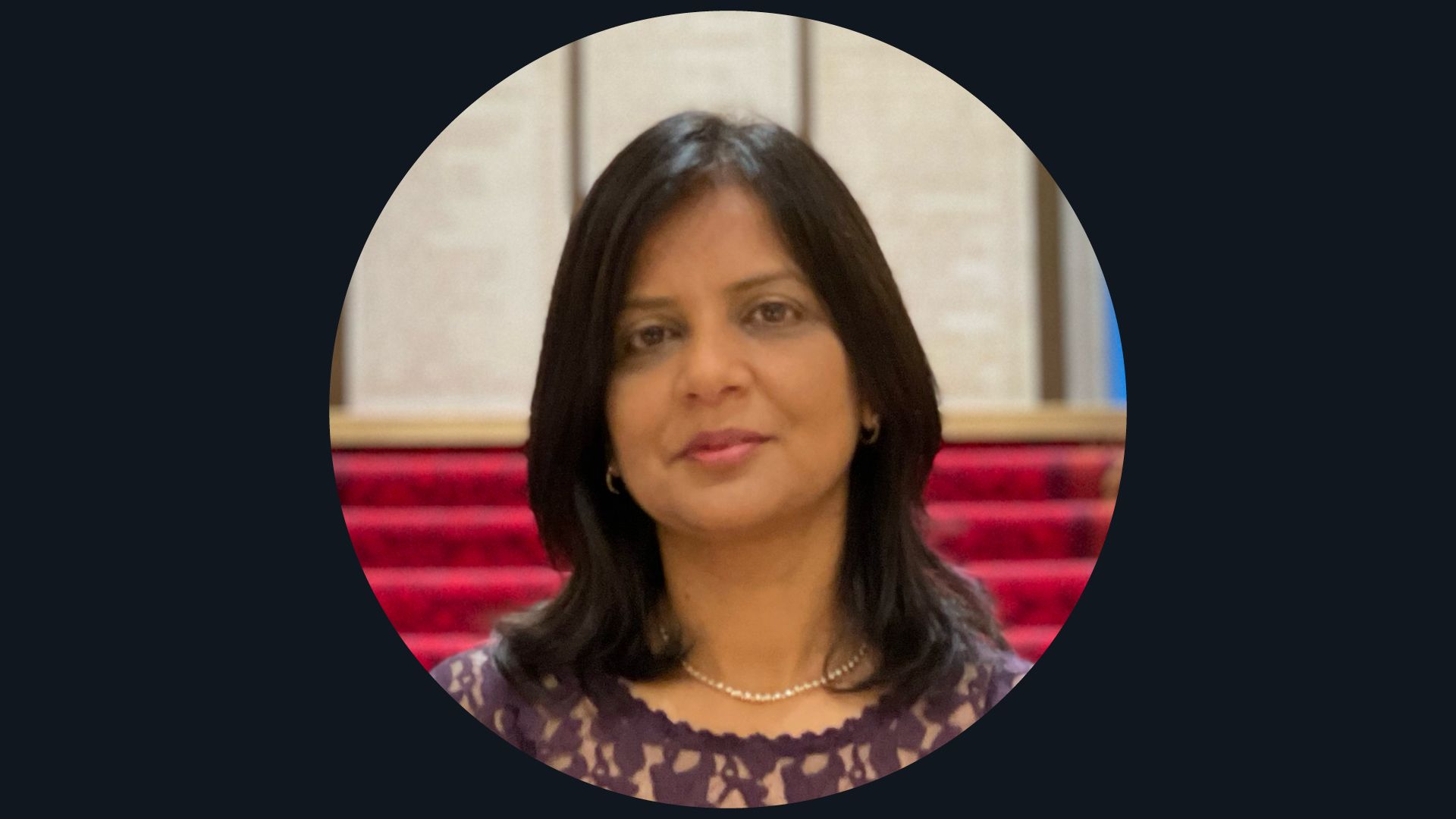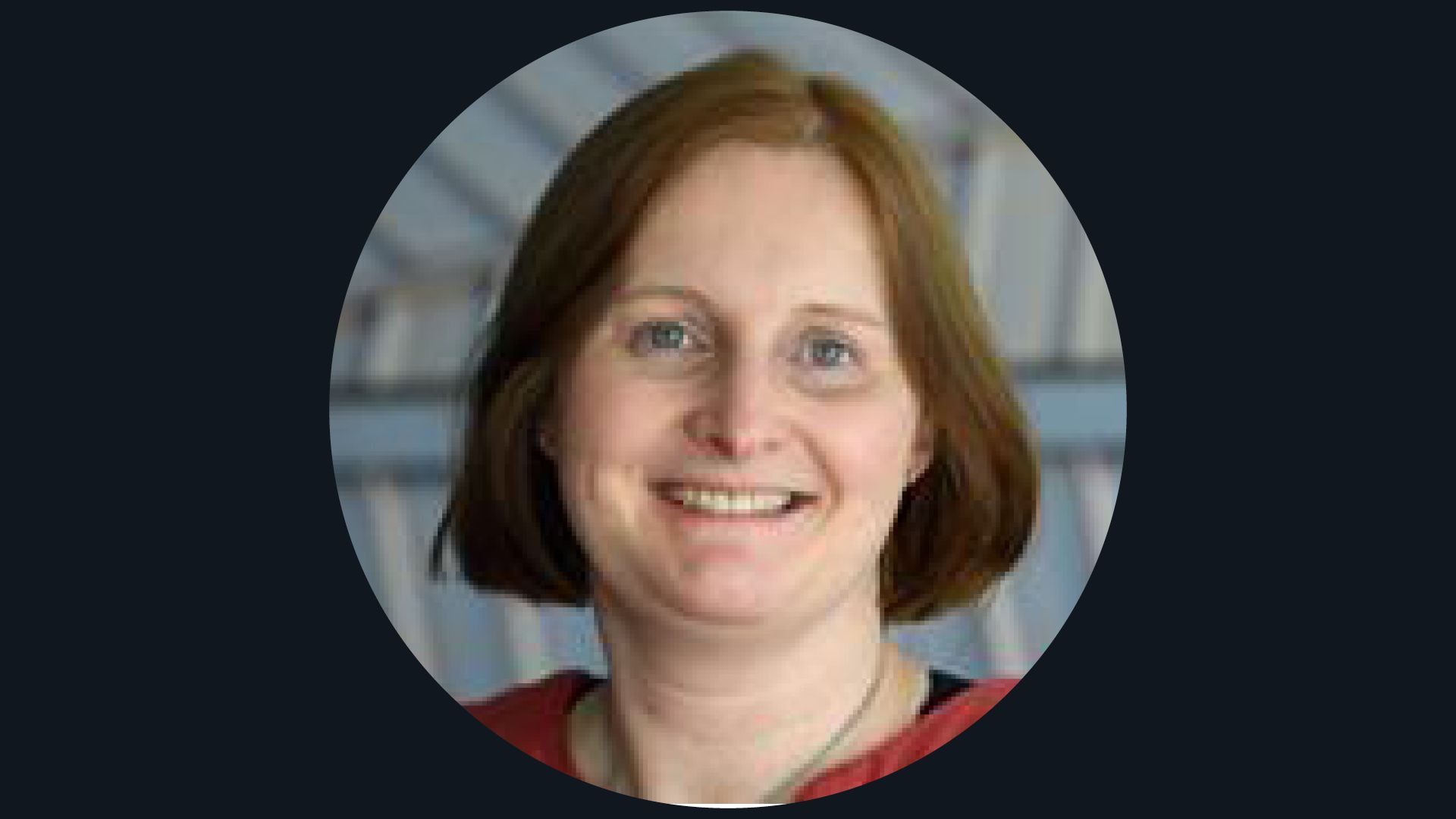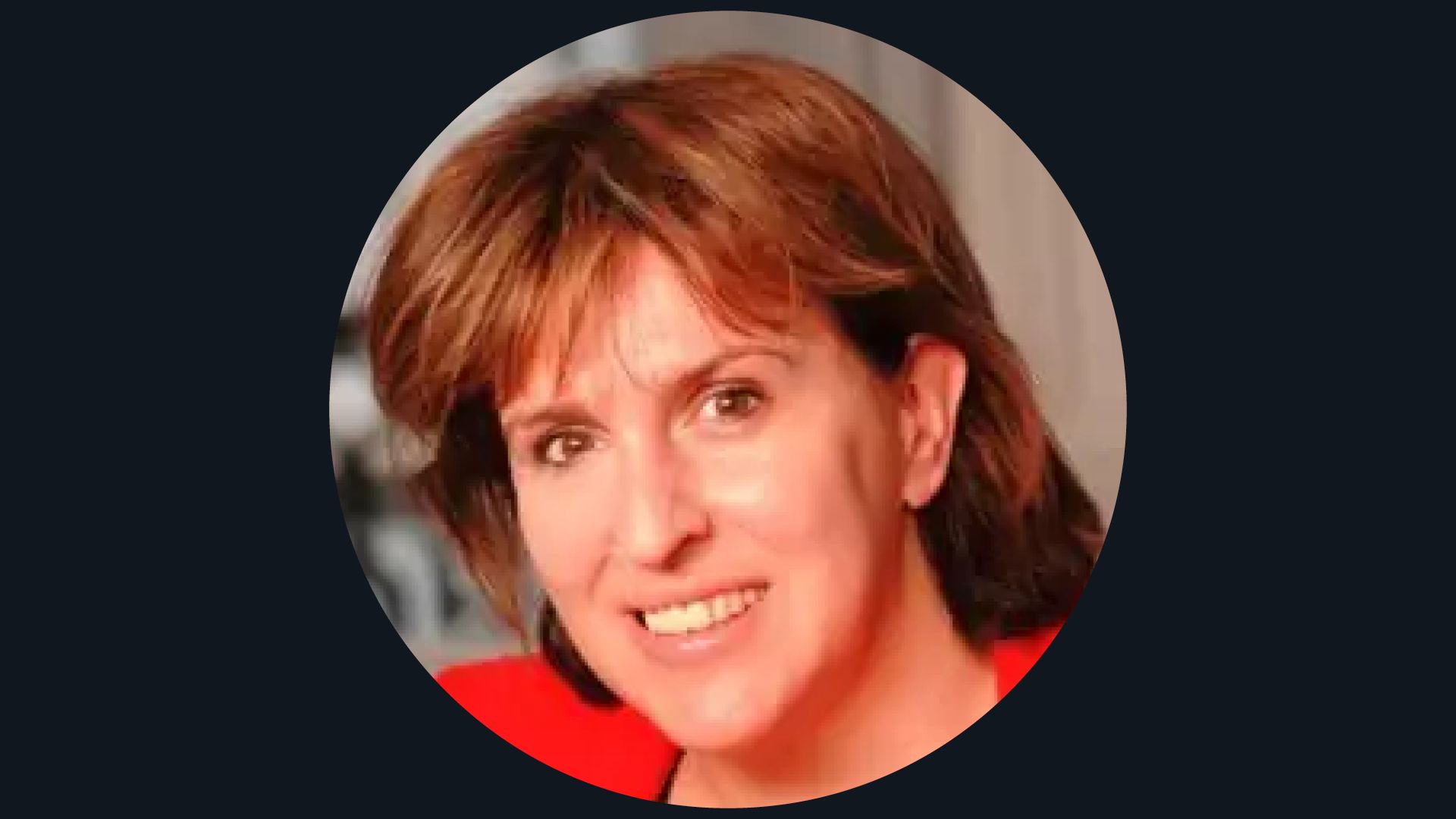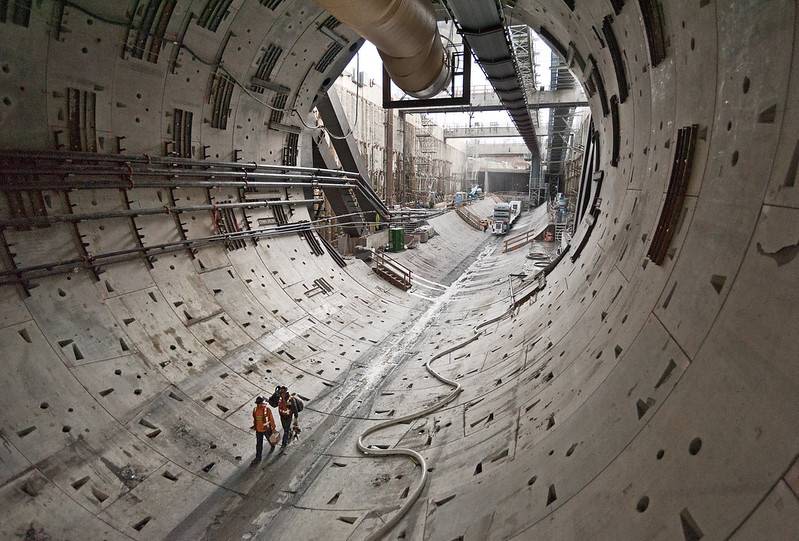Podcast: Women leading infrastructure
Why is there a shortage of female leaders in infrastructure and construction, and why is this an urgent problem for us all?

In this podcast, we're talking about the shortage of female talent working in top jobs in construction and infrastructure. What is putting women off these jobs?
Join Julia Prescot, Deputy Chair of the National Infrastructure Commission, and experts Prof Priti Parikh and Dr Katharina Burger from UCL's Bartlett School of Sustainable Construction, to examine how we can do more to build a pipeline of female talent.
Listen to the podcast
The Bartlett Review Podcast: Women Leading Infrastructure
Photo by Josue Isai Ramos Figueroa on Unsplash
Photo by Josue Isai Ramos Figueroa on Unsplash
Transcript
Priti Parikh: This is a podcast from The Bartlett Review, sharing new ideas and disruptive thinking for the built environment. Brought to you by The Bartlett Faculty of the Built Environment at University College London.
Julia Prescot: When we look at the way that the workforce in infrastructure and construction is made up at the moment, basically it does not reflect the entire population.
Priti Parikh: If you can embed leadership right from the outset, for me that’s a big win.
Katharina Burger: So it’s unacceptable nowadays in the construction sector that someone might die on a construction site, but we still seem to think that it’s acceptable that we don’t have women in leadership positions. Why?
Priti Parikh: Hello, I'm Priti Parikh. I'm Professor of Infrastructure Engineering and International Development and the Director of the Bartlett School of Sustainable Construction.
In this episode of The Bartlett Review podcast, we are going to talk about the shortage of female talent working in the construction and infrastructure sectors and why this is an urgent problem for all of us. For many years, governments and employers have been talking about the benefits of hiring more women to work in the top jobs in engineering, construction and built environment. But despite those efforts, the lack of gender diversity remains a serious problem. What is putting women off these jobs and how can we do more to build a pipeline of female talent? By women we mean everyone who would identify themselves as a woman.
Today I'm joined by by two brilliant women who are well qualified to answer those questions. First is Julia Prescot, who's Deputy Chair of the National Infrastructure Commission and co-founder of Meridiam. Welcome, Julia.
Julia Prescot: Good morning Priti. Delighted to be here.
Priti Parikh: And also here with me is my colleague Katharina Burger, an Associate Professor at the Bartlett School of Sustainable Construction. Welcome Katharina.
Katharina Burger: Thanks Priti.
Priti Parikh: Perhaps it would be useful if you could start with some context. Julia, can you give us a sense of the current situation and talk a little bit more about where we could realistically aim to be?
Julia Prescot: Yes, thank you. Very happy to do so. I think first of all, I'd really like to say in the infrastructure space, I very much believe we should create a diverse and inclusive workplace that is representative of the public we serve, and ensure that infrastructure, planning, decision-making and implementation reflects the needs of the entire population.
Now, when we look at the way that the workforce in infrastructure and construction is made up at the moment, basically it doesn't reflect the entire population. And I did have a look at, I've been talking about statistics, and I did have a look at some of these statistics, and one of the things I'd say is that they're very uneven. They are not looked at very frequently, and certainly a number of the data points are actually pre-Covid.
So just a few statistics, let's just take the water and energy sectors. At the moment, women make up 23.3% of employees in these sectors, but only 5% of major director roles are held by women and only 2.1% in construction. It's improving, but very slowly and with very little change, despite the variety of initiatives that are taking place.
We had a further consideration around more general statistics in the infrastructure space. And what we're seeing there is an improvement. So for example, we had female directors and senior managers across the whole space over the last 10 years, increasing percentage points from 12 to 19.3%. But when we look a little bit further down below the director and management space into the more junior roles, we are really seeing not a great improvement. I mean, one of the areas that I looked at is if we look at around anything around skilled trades or elementary occupations. I mean not just a percentage, but a vast percentage of the roles are taken by men and a tiny proportion by women. So we're not seeing a balanced picture across the board. We are seeing improvement, but there's an awful lot more to do.
Priti Parikh: So I think what you're saying is we are seeing an improvement, but some of the stats are quite stuck, especially on leadership and decision-making and how women play a role in the built environment infrastructure sector. And I personally think UK would benefit, and UK infrastructure would benefit, from having women in more senior roles.
Julia Prescot: Well, I go back to the original points I was making about diversity. I think that we face, particularly in large projects, very difficult decisions. Diversity is often an approach that we need to take so we have as many brains and approaches and thinking all coming together to solve the problems. And I think that when we have a tendency potentially to group think from a cultural or social perspective that we would not get the best outcomes. And I think that when we have diverse groups of people coming from different directions, then I think we're going to get better outcomes.
Priti Parikh: Julia, can you tell me a little bit more about the Diversity in Infrastructure Coalition and Charter, which I know is about guiding people to outcomes which are acceptable across the board in industry?
Julia Prescot: I think where we are at the moment is still very much working with the various parties gathering data, and perhaps the word Charter might not come out at the end as the most suitable instrument. But what I would say is that the concept that we're taking forward is that degree of standardisation of approach and looking at embedding in different corporate and public sector organisations baseline a standardisation and a single approach. I mean we've got to be clear that negative perceptions of women, expectations of behaviour and treatment should also be standardised and should be considered inappropriate that any of these activities now take place or that they're even thought of.
Priti Parikh: And as part of your work, you've been convening round tables with leaders from construction infrastructure.
Julia Prescot: Actually one of the points that really pulled me up, people were talking about the initiatives, they're talking about their experiences, what they've done, and I had a very clear voice saying, well, what is the aim of all of this? And I think it actually exemplified the frustration that women feel at the moment. There's all the groups that have come together, the initiatives that have been made stepping forward, and yet there still seems to be a significant imbalance in the construction and infrastructure sectors between men and women. And the stats we talked about in the first instance are very clear about that.
Priti Parikh: Absolutely. And Kat, you've been doing a lot of thinking on the current gaps, but also obstacles that typically stop women from following careers in infrastructure, construction and leadership roles.
Katharina Burger: Yeah, so I think in terms of the research that we have, there is a lot of work inside of organisations that tends to focus on standard and historically well known issues such as not having flexible working opportunities and sometimes what is felt to be a discriminatory culture. There are questions around the leaky pipeline. So we have an increase in female graduates in engineering and construction, but somehow they're then lost on the way to leadership positions. There are much bigger questions around the way that the approach to women in infrastructure industries is currently framed. So because there is so much focus on programmes inside of organisations, many of the structural issues and the question of societal influence on the role of women in construction is often simply not considered.
Priti Parikh: You talk about flexible working practises. I mean this is not great for those with caring responsibilities. And part of the challenge is that women often end up doing the heavy lifting on caring, which is why the flexible working practises are even more important for them.
Katharina Burger: It's debatable because there is research that suggests that flexible working is then perhaps not always connected well to career progression. There is a risk of all these small policies in organisations being in some way supportive of women staying in the workforce, but then not achieving what we're talking about today, getting into leadership positions, because this idea of the leader being an all-consuming role is still there. And until this changes and there is perhaps a rethink of how we structure organisations to be less hierarchical, or if we unpack the role of the leader a bit more, there is perhaps a gap between where we allow women to be and where we would want to see change.
Priti Parikh: I mean, yes, the future leader, what would the future leader in construction and infrastructure look like, and how can we create an enabling environment for women to progress? Lack of progression is a big challenge, and recognition, and quite often women end up doing roles or activities for organisations which are not then recognised as a metric for progression. So rethinking what leadership means in the industry, and rethinking what those progression metrics are, I think is quite critical.
Julia, what are your perceptions of what leadership should be in construction and infrastructure? I know this is a big question.
Julia Prescot: When we're looking at leadership in construction, I do think that we often come down to that male stereotype and the feeling that the physical strength is absolutely essential, not only in being able to physically move whatever you are constructing, but also in terms of your meetings and approaches to meetings. I always remember some years ago, somebody very much in the construction industry who said, well, no, you can't be a real manager 'till you've been shouted out by men above you and you can show that you are a man. And I'm thinking, whoa, this is quite good stereotyping that you're giving me here. But this was an individual who was very much, how can I put, it imbued with the traditional mores of the construction industry.
But I think that we always have to be careful when we're talking about leadership in the construction industry that we first of all park that vision. And say today, what qualities are we looking for in terms of leadership? So I think we need to think about the wording when we're talking about leaders. I think we need to think about the advertisement when we're advertising for leaders. And I think we need to think about what actually is a very positive outcome.
Priti Parikh: So recruitment is important. Thinking about the composition of panels, do we have diverse panels who would understand diverse voices and views? Processes that can remove unconscious bias as well. So can we anonymise applications? So thinking about those action points that can help remove biases, can help improve recruitment. I think it's also important in addition to addressing this issue of progression, which I keep on coming back to, I was wondering if there are other barriers.
Katharina Burger: I mean there are stereotypical ideas about women lacking confidence or requiring on average 70% of the job description to represent what they already can do, whereas men go for jobs that I think 30%, that can do 30%, of it and will grow into the role. But these are anecdotal figures. I don't know if that is truly what holds women back. I think it's more a question of assuming that, or getting to the tension where the idea is that women need to fix themselves to meet certain expectations.
And the other question is what would be required in terms of a transformation of organisations, of expectations that we have of how projects are assembled in terms of people to deliver infrastructure in a way that delivers the social benefits. And I think for me, this is a key question. If we are having most of the infrastructure investment being delivered through projects and we accept that these projects should have societal benefit, then they should be delivered by organisations that in some way are representative of this society. And I think that's where there was always this question about there must be a business case for getting women in certain roles, but it's a principles based case and fairness based case for me.
Julia Prescot: I think it's interesting what you say about fix the woman because I was looking at the, I think it's Ely and Meyerson work that was done around 2000. Really the four points that they made, which I think are fascinating. First of all, how do you solve the problem? Fix the woman, great. Then you value the feminine. You say, my culture is to value the feminine. Then you have policies to compensate. So additional childcare, flexible working and the rest of it. But the fourth point, and the point that they made back in 2000, I think it's probably still relevant, is actually reviewing the work culture, making sure that work culture all around women is very sympathetic to their progression. And it's actually making sure that we think more now about what the work culture is like. Let's try and think of a way we can really impact on the culture.
Priti Parikh: Absolutely. At The Bartlett School of Sustainable Construction, we are thrilled to be working with you on this. This is something Kat has been leading on.
Katharina Burger: Yeah, we were invited to contribute a case study to the report that Infrastructure Matters put together, and we highlighted three different ways that we are trying to increase gender diversity at BSSC. So one is our inclusive curriculum health check, and the second one is the gender diversity around our students. The way that we recruit and in particular, and thanks to Julia, we have a women's scholarship for our MBA in Major Infrastructure Delivery and that has led to a significant increase in women-led applications to the programme. And the last one is really the research that we do, and I think that's where we're world-leading in terms of also making sure infrastructure is fit for women.
Priti Parikh: And the research point is key because we can build infrastructure, but if we do not have, say I'm talking about simple measures, do we have enough street lighting, is it safe for people to move around, especially women? Because those become barriers for women to be engaged in the workforce.
Julia Prescot: No, I think that's the second part of it as it were. I think first of all, we need to think organisationally, we need to think about culture, we need to think about progression. The second area, we need to think particularly in an infrastructure sense, what are the design decisions that are being made? Are they broad enough in the context of, I mean, we come back to street lighting, we come back to transport and we come back to safety quite often. Also, we need to think about accessibility as well.
Voiceover: This is The Bartlett Review Podcast: sharing new ideas and disruptive thinking for the built environment.
Priti Parikh: Thinking about a future with artificial intelligence, big data, digital technologies, is going to be very, very important. I was wondering if there's a role for digital transformation of the sector and whether that would help to address this challenge, Kat?
Katharina Burger: Yeah so I think that's a really interesting point, because there is some research which suggests tentatively that with the digital transformation of the construction sector, we have new roles emerging and we also transformed the way that we've traditionally done construction. So things like site visits may be no longer necessary, we can have virtual inspections. So we have new skills that are needed and we have new ways of planning and designing and monitoring assets. And so there's a question, what does it mean for women, this transformation in the construction industry? Does it mean that we now have greater opportunities for culture change, change in the way we work, change in the way we build? Or is this something that we're perhaps being too optimistic about? Because considering that lots of technical skills are needed and looking at the STEM subjects or to data and analytics degrees that we have in universities, we have a similar representation of women there. So it is something I would really like to get your views on.
Julia Prescot: I mean, I do have a slight concern that people that are writing the code tend to be overwhelmingly male. Where AI will help, going beyond actually who's writing it, is potentially in transparency and accessibility of knowledge. Because what I think one of the issues in the gender balance has actually been a lack of transparency. I mean clearly the most glaring one is the gender pay gap. And it actually does give us a good data point in relation to what we've been talking about. If we just look at the construction project managers, the gender pay gap there is that women are paid 18.9% less than men. And on the civil engineering side, women are paid 11.2% less than men. Gender pay gaps are sometimes difficult to really dive into because it's not absolutely clear on seniority. But I think it's a good indication, a good data point that within the industry, women are not on equal footing to men.
But there's lack of transparency in statistics, in recruitment processes. And I think if we can open up the field using as many data sources as we can, it'll become clear that if as a senior person you are actually promulgating the idea that you should have as strong gender balance as possible, then I think you can then either show it or not show it in the context of how transparent you're being with the data below. And data is, I mean that's one good thing about AI, is data is made to be about easier to manage. The bad thing is we don't know who's writing some of the underlying code.
Katharina Burger: It's a question more than a point. And so with digital transformation, how we learn changes also. So we have lots of online learning opportunities now, lots of ways of skill development that do not require in-person learning or traditional ways of taking our time and the way we deliver learning changes. Will that change how workforce learning changes? So will women have great opportunities to progress throughout and maybe stay by acquiring skills in this way? What do you think?
Julia Prescot: You see, I think you've come across a classic female approach. Nothing wrong with it, absolutely nothing wrong with it. But the classic thing is if I can gather as much information as I possibly can, then I am going to be able to progress. And I mean I think a lot of women are like that, and I think you've already quoted the statistics on that.
I think there's another element as well that we can see, which is if I'm in an environment that remains collaborative and shows the impact of decisions that are being made and that I've got enough time to question those decisions, I'm going to be talking about a sort of different social cultural world that isn't going to be specifically related to knowledge, but it's going to be related to approach. And there's a great danger somehow that women sometimes don't interact enough in terms of making their voices heard. They think if I know a hundred percent of it, then I'm going to be successful. And then certainly some man appears above them saying, I don't care about a hundred percent.
Priti Parikh: I mean, coming back to data, the thing about artificial intelligence, it relies on data, it's data hungry. But if you think about evidence on leadership in construction and infrastructure, if you were to run an AI model of some sorts, and I'm not an expert, but if you were to run an AI model and think about what it showcases from the data we have, how much would it be linked to women leaders?
Julia Prescot: It always depends on the question you ask. If you look at the quality of decisions that are made, and that's maybe an error that AI can help us with, you actually look at the output of those decisions, then you reassess that in the context of if you had taken a differently gendered approach. I mean I think one of the examples is use of that is Carillion, would there be a different type of approach? Would there be a different outcome? And so I think we can use that type of data, but if we use what I call just sort of top level historical data, it's rather like the average history book, not a lot of women appear. But if you look at the quality and the output of data that you get and you actually compare that in a differently gendered world with differently gendered approaches, then you can maybe think, well actually this could have had an impact.
Priti Parikh: So basically it means that we need gender diverse teams, human beings who can interrogate the data but also make sure they're asking the right questions from the outset in terms of quality.
Julia Prescot: I think that's really important.
Priti Parikh: And I think that's also key in the use of digital data information for the benefit of engineering and construction sector.
Katharina Burger: One of the arguments I read when preparing for the podcast, and I think it's a lie, but it basically said something around women don't want to go into the leadership positions. Why would you want to give 60 hours a week to a role that's probably going to last only two to three years? Because tenure is short in infrastructure, major infrastructure projects. So it's basically a quite smart move that women don't go for these positions because it's not very attractive if you look at it from a work-life balance point of view. And maybe you have a sufficiently good quality of life not doing this
Julia Prescot: Well. I think that's got a bunch of preconceptions in there, hasn't it? I think actually it's a very typical statement of post-event rationalisation, isn't it? We haven't got any women here because actually they don't really want to do it, do they? And they've got this wonderful work balance and we don't accept it. So therefore we'll put men in charge, we'll pay them more, we'll give them better terms and conditions. We'll call them leaders and we'll say, you have the decision out there. And to me, I've heard that over again. Oh women, they don't want to work a 60 hour week. So really what are we looking at? We're making preconceptions about what women want in life.
Priti Parikh: So are women criticised more for failures? Is there a bigger fuss kicked up when women leaders are perceived to fail?
Julia Prescot: Sometimes it's easier to point out what is seen as the shortcomings of women when there are fewer women. If we could flip it on the other side, the shortcomings of men when there are a lot of men tend to get sort of subsumed in a way into the volume of numbers. And I think it's this actual picking on particular individuals as being the ones to blame. Who am I going to blame? Oh look, there's a woman. Clearly our cultural mores would suggest that women aren't suitable for this and clearly she's not a suitable woman. It's easy steps to make. Whereas if we actually had a more robust culture in the context of thinking about male and female leadership, it wouldn't be such an easy number of steps to make that are then going to be picked up by the media and repeated. And that's when the persecution starts. Some women actually want to lead. I'm not sure that, in your statements, there's any suggestion that there is actually a desire in women to lead.
Katharina Burger: I think that one of the issues is that there is this term woman, it's a box and it's a category. But when you look at it from the gender research point of view, it always emphasises it being a process, a learned process, assigned norms, assigned role expectations. And if we look at being a woman as a process, then I think we can unpack the culture change idea rather than going in for women are like this and they don't want to do that. So it's important to also take this idea of social progress by unpacking what it means to be a woman in infrastructure and construction.
Priti Parikh: And also here we're making an assumption that all men will want to lead automatically. And it could be the case that not all men would want to lead as well.
Julia Prescot: Exactly. And I think this argues for education, not only the individual from the very early stages, but education within the workforce as a whole. And there's been some interesting research, again from McKinsey that's often quoted in this area in terms of having that breadth of diversity coming in, changing companies, improving their results. So that's something when I'm listening to the statements you're making, I'm thinking to myself, well who's ever thinking that is assuming that there is no general benefit to having diversity, they've just got a thing against women really.
Priti Parikh: And I wanted us to reflect on the role of higher education institutes and universities, because I think that we play a major role in this, especially for building up the talent pipeline that we need for the sector. And if we can embed leadership right from the outset, for me that's a big win. So for example, in The Bartlett School of Sustainable Construction, we offered a range of programmes right from the undergraduate level, postgraduate to an MBA. I'll come onto the MBA in a bit, but the undergraduate programmes are quite exciting as well because there's an opportunity for us to talk about leadership right from day one. And in fact we are working on a new undergraduate programme where we want to combine engineering skills with leadership skills, and in the way that students who come to look at engineering design, we'll also look at leadership from day one. But then coming to the leadership piece, we've introduced an MBA in Major Infrastructure Delivery and this is the only MBA on the planet which focuses on infrastructure delivery.
Katharina Burger: Yeah so we've learned that many applicants need to make a case in their organisations to be sponsored to get on the MBA. And I think just knowing that it's possible to make that case regardless of your gender, and making the case perhaps, particularly because of the underrepresentation, so taking all the facts we've gathered in this podcast and using that to make a case to be on the next MBA cohort, I think is an option. We are also, of course actively trying to make sure that the speakers on the programme are diversified. So we are looking for women leaders in the construction industry to come forward and be mentors, be role models to our students on the cohort. I think we still have an imbalance at the moment, so probably an 80-20 split.
Julia Prescot: That's like the rest of the industry, let's face it.
Katharina Burger: Yes! It is representative of the industry. But we really want to also make a case there to change the status quo.
Priti Parikh: And Julia, we are ever so so grateful to you for supporting us with a scholarship for women who would like to join us on the MBA programme because that's a tangible action point. We are doing something tangible about it rather than just talk about barriers that women face in leadership. And I think our big ambition is to roll out a larger programme to get more women applicants, those who are struggling to find industry sponsorships to join us on this leadership programme. Because in turn they will go back to industry, they will be inclusive and diverse leaders we hope. They will then hopefully create a pipeline of women who are not only keen to take on leadership roles but are well supported.
Julia Prescot: I'm delighted to be able to support women through this course. And I think it's incredibly important to help in the sense not only of the education, but also the credibility of women in the workforce and actually enable them to be valued in their organisations as people who will have a positive long-term impact on the organisation. Again, going back to transparency, if people see within the workplace that women are moving up in this way, being recognised in this way, it also assists with cultural change.
Priti Parikh: So we've been talking about the higher education sector, research, our ambition for more women to be leaders in construction infrastructure. What are other factors that could influence this? And I'm thinking about, for example, the bottom line, commercial factors or benefits, or the political will.
Julia Prescot: Picking up those points on the commercial side, we do have certain data sets that appear to show, and I mentioned McKinsey, that companies that embrace diversity appear to have better outcomes. But let's think about that a little bit more practically. We've got to increase our workforce. We are very short of project managers in this country, particularly project managers in infrastructure, we need to really embrace the widest extent of available people who are going to help us take infrastructure forward in this country. And that is going to be both men and women. So there's a real commercial benefit in trying to attract the widest talent that we have available into the system. On the political side, I would say that sometimes the sort of idea of supporting women into employment or into senior employment doesn't come through. It's not seen as being high profile enough.
And if we could see that there were real drives into providing more financial support for women at the sort of 'fix the woman' level. So with childcare with more flexible working, if we could see those sorts of policies and then we could drive them through into actually helping women into making companies more diverse, I think it would be very beneficial. Maybe we'll see some of that. I think we've certainly seen indications that these are on people's agendas, but it's going to go right the way through from the very earliest stages.
And as a final point, I would say that I find the public sector on the whole more gender balanced than the private sector. When you look across the appointments for permanent secretaries or, I mean, I was delighted to read that, I think, and I'm hoping it's still true as we speak, but that the ambassadors in the major G20 capitals there, all the British ambassadors are women. So I think on the public sector side, we've got a lot of that cultural change. It's going to be the private sector side I suspect we've got to push harder.
Katharina Burger: Yeah, I think it was interesting what you said earlier with the Charter that it is inspired in a way from the way that safety is perceived. So it's unacceptable nowadays in the construction sector that someone might die on a construction site. We just think that's not acceptable. But we still seem to think it's acceptable that we don't have women in leadership positions. Why? Why do we accept this as something that is just the way it is? But if we started with a similar thinking, if we said there are some things that are not acceptable in today's day and age, then perhaps many of these questions around business cases or having to prove that something will work before you even start doing it. Maybe they would become less of a barrier to changing the status quo.
Priti Parikh: So actually in the future, what we want is women in leadership to be business as usual.
Julia Prescot: Absolutely.
Priti Parikh: A normal thing.
Julia Prescot: It shouldn't be questioned. And what we want more than anything else are those stats to be normalised. We're not going, you don't solve everything overnight. But I think that one of the interesting areas is that certainly in our launch there was a great deal of political support as well across the board in actually making this real. We've got a way to go in getting, whatever word I use, Charter for convenience at the moment, whatever comes out. We have a way to go, but I think it's a time that we really need to capture the feelings and frustrations and direct them towards what I've said is this very tangible outcome.
Katharina Burger: Well, the UCL Bartlett School of Sustainable Construction is involved in building the Coalition and we are investigating how we can support this with research and collaboration in order to provide the data and evidence to support building the Charter. And you can find the link to the report in the show notes that come with the podcast.
Priti Parikh: Massive thanks to Julia Prescot and Katharina Burger for joining us today for a very lively discussion on women leadership in construction and infrastructure. And for more information about The Barlett faculty of the Built Environment, you can visit us at our website, ucl.ac.uk/Bartlett, and follow us on Twitter, which is now called X as well, @TheBartlettUCL
Read the report
Women In Infrastructure: Sharing Best Practice To Accelerate Gender Diversity
Published by Infrastructure Matters
About the speakers
Julia Prescot
Co-founder and Chief Strategy Officer of Meridiam Infrastructure and Deputy Chair of the National Infrastructure Commission
Major Infrastructure Delivery MBA
This unique MBA programme equips mid-career professionals with innovative management and leadership practices to successfully deliver major infrastructure projects.
Podcast produced by Adam Batstone
© UCL The Bartlett 2024


